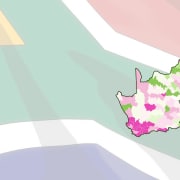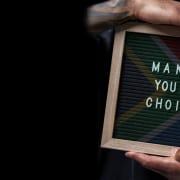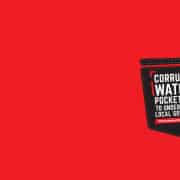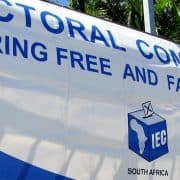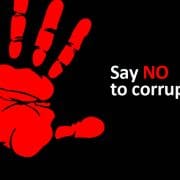|
Getting your Trinity Audio player ready...
|
By Kenneth Mokgatlhe
First published on EWN
As we approach the local government elections, many people are not really worried about who will collect their garbage or which municipality will achieve unqualified audits. Poorer communities are concerned about their dry taps, skyrocketing levels of unemployment, hungry children, and ever-growing corruption without any consequence management in place.
The South African Jewish Board of Deputies (SAJBD) hosted an esteemed panel this week, attended by more than 80 participants, which included well-known journalists, researchers, and political commentators. The panel was led by SAfm’s Stephen Grootes, and the panelists consisted of independent political commentator, Dr Ralph Mathekga; thought-leader and academic, Nompumelelo Runji; and Daily Maverick columnist Wayne Sussman. The topic of the session was ‘Navigating the local Government Elections 2021’.
While the African National Congress (ANC) is becoming less popular in many black communities, there seems to be no political party able to take advantage of the ANC’s misfortune. While political entities may not get a piece of the ANC’s pie, the independent candidates may do so.
Collecting garbage or achieving a clean audit might be a political achievement, but does it matter to poorer South Africans? No. People are looking for paying employment to be able to improve their livelihoods.
According to Runji, “People judge good governance according to whether their quality of life is improving or not. Despite the deteriorating record of the ANC in any municipality, we still see the ANC securing those municipalities.”
Same old same old
The ANC has been embarrassed during their campaign trails at Katlehong, Naledi (Soweto), Tembisa, Mpumalanga province, and other areas for their bad governance. What is clear to voters is that the ANC has not introduced new ideas on how to instill hope in the electorate. They are still saying what they said in 2011, the only difference perhaps being that President Cyril Ramaphosa has acknowledged that his party has failed the people.
Most people who are angry with the ANC appear to be members of the party, many of whom are in good standing. “Kgalema Motlanthe came forward and acknowledged the public anger, and so did President Ramaphosa some weeks ago. With all of this, we do not expect the opposition parties to benefit from this discontent. The problem with this election is that there is a lot of anger but there is no consolidation,” said Dr Mathekga.
He was referring to the consolidation of the opposition parties in the 2016 election where the ANC lost three metros (City of Tshwane, Joburg, and Nelson Mandela Bay), and the ANC governed the City of Ekurhuleni with the help of three small parties.
Attracting controversy
The second-largest party, the Democratic Alliance (DA), under Mmusi Maimane, seems to have appealed more to the black electorate at that point than it does now under John Steenhuisen. Well-known politicians such as Herman Mashaba, Athol Trollip, and Solly Msimanga represented the DA in metros. Many of those leaders from the DA who inspired confidence in black communities left with Maimane.
“The DA go out of their way to attract controversy, disregarding their strategic interest in a province. They go out of their way to get into trouble because they have failed to attend to critical issues,” Dr Mathekga added. He was referring to the recent controversial DA posters in Phoenix in KwaZulu-Natal which read “The ANC called you racists. The DA calls you heroes.” Many people lost their lives during the July looting spree which happened mostly in KwaZulu-Natal and Gauteng in the wake of the arrest of former President Jacob Zuma.
The DA has controlled the City of Cape Town and most of the municipalities around the Western Cape since 2016 and that has helped them to consolidate their power and popularity to claim the hegemony of that province to date.
Competition fierce in 2021
Sussman said the 2021 elections were unique in that it was not only the ANC, DA, EFF, or IFP dominating the political arena. “It is just so astonishing that it is a very competitive play compared to the 2016 election. It is very unclear what will happen in the 2021 election.”
Sussman reiterated Dr Mathekga’s sentiments that the ANC’s misfortunes would not really translate into the growth or dominance of the smaller parties.
“The ANC has done so well in terms of providing access to certain services such as sanitation, water, electricity, and roads. The problem has been sustaining those services. You have taps that do not always have water, poor maintenance, and the fact that those services do not reach everyone. The problem is the skills mismatch and the failure to respond to capacity,” Runji said.
Local government was established to assist in addressing the past inequalities at a grassroots level. This means that local government is the intimate sphere or aspect of government closest to the people. It is where residents are supposed to have a direct political relationship with the government, but that has not been happening.
If used effectively, local government is not only a vehicle to be used exclusively for service delivery, but it can also be used to involve people in the democratic processes. People should be able to participate in decision-making about their lives, especially at the local government level.
Kenneth Mokgatlhe is an independent writer, social and political commentator. He holds a BA (honours) in political science from the University of Limpopo. A former PAC spokesperson, Mokgatlhe is currently studying teaching at the University of South Africa.

